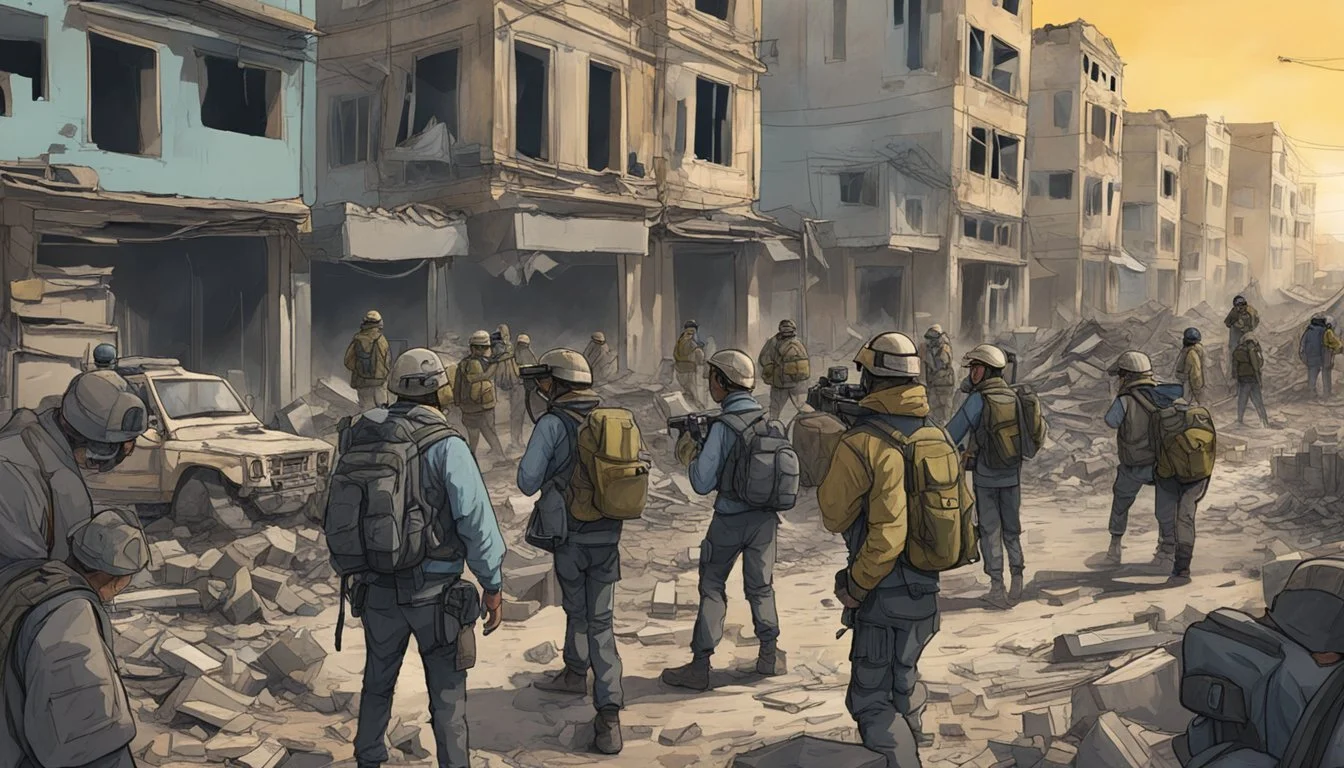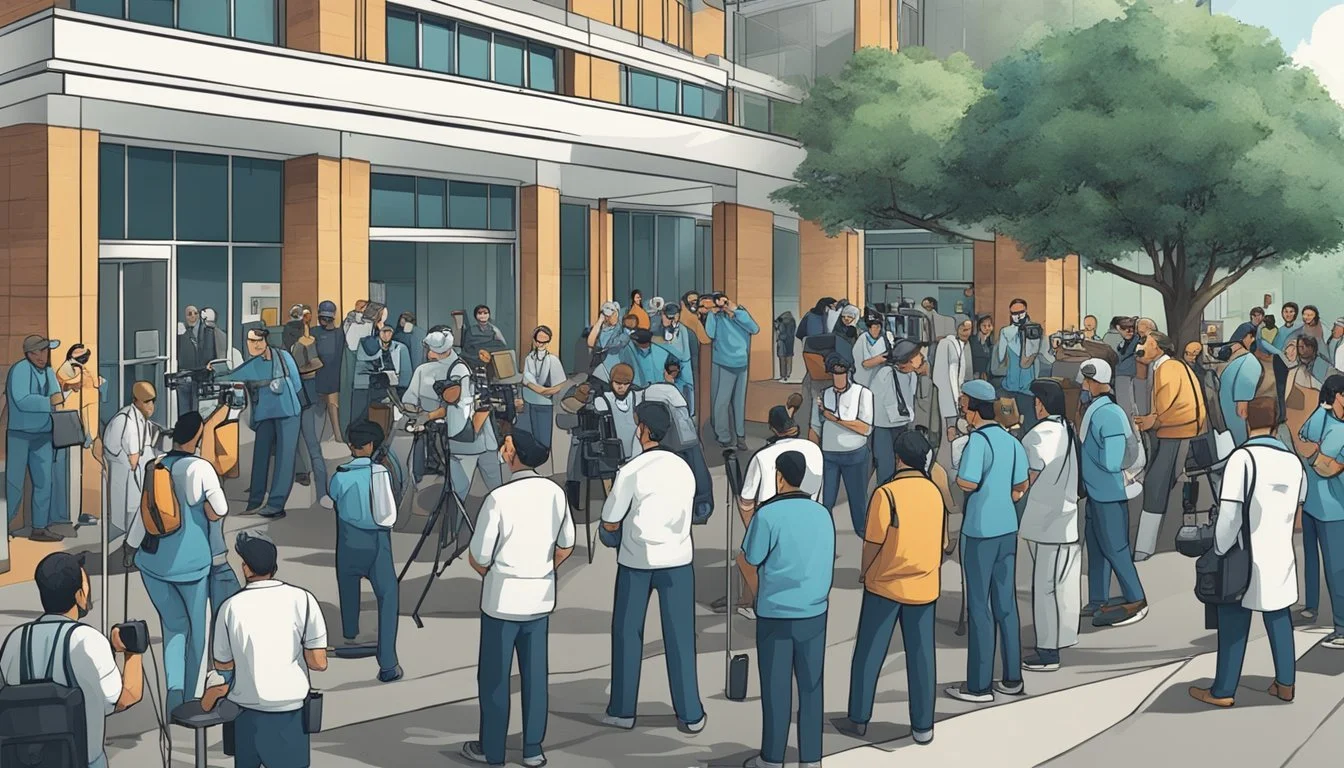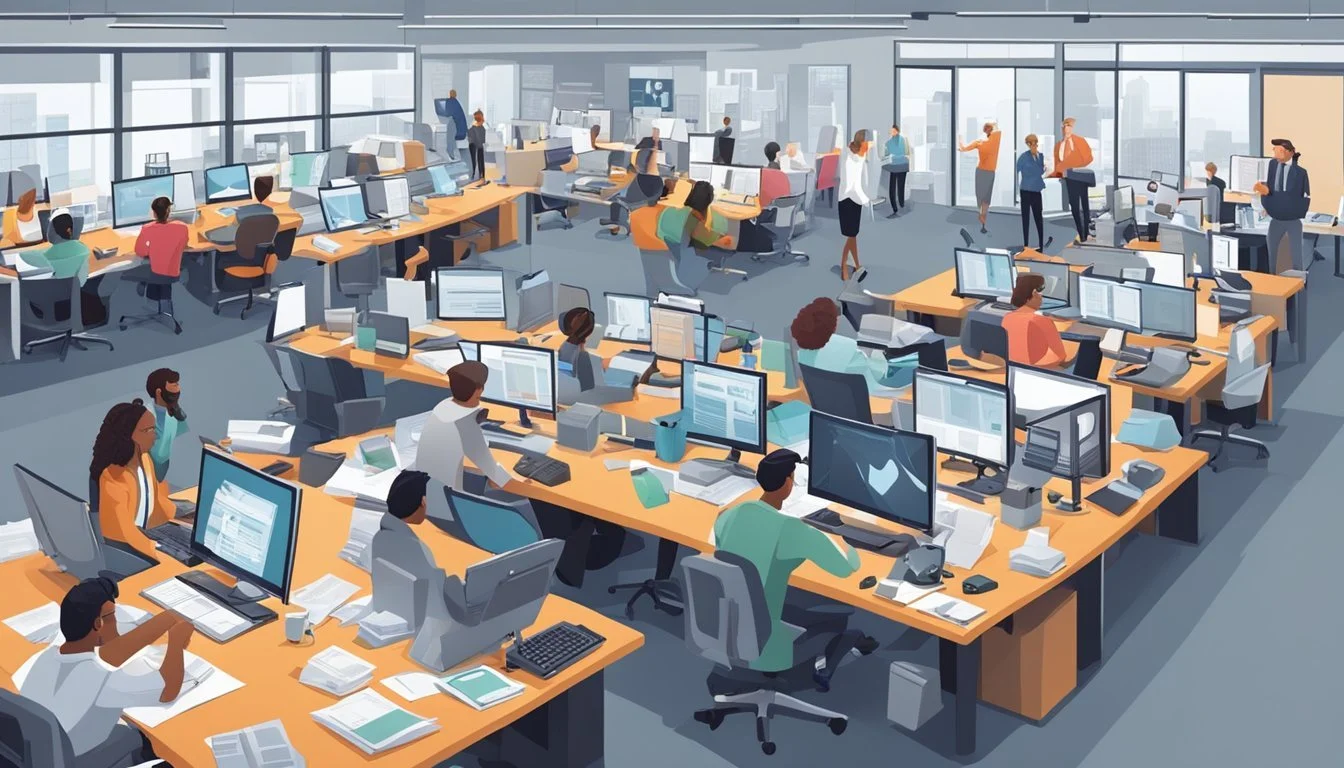Unmasking the Truth: Frontline Documentary Exposes Hidden Stories That Will Shock You!
Frontline documentaries have become synonymous with hard-hitting investigative journalism on television. These acclaimed films tackle complex issues and shine a light on crucial stories that shape our world. Produced by PBS, Frontline has earned a reputation for rigorous reporting, in-depth analysis, and compelling storytelling that brings important topics to life.
From politics and war to health and social issues, Frontline covers a vast range of subjects with unflinching dedication to the truth. The series has garnered numerous awards for its fearless approach to exposing corruption, uncovering injustice, and exploring the most pressing challenges of our time. Viewers can access over 200 documentaries for free online, providing a wealth of information on both current events and historical topics.
Frontline's impact extends beyond mere reporting. By presenting thorough investigations and thoughtful examinations of critical issues, these documentaries often spark public discourse and drive social change. The series continues to adapt to the evolving media landscape, releasing timely films that contextualize rapidly unfolding events and shed light on lesser-known stories that demand attention.
Origins and Mission of 'Frontline'
Frontline emerged as a groundbreaking investigative documentary series on American public television in 1983. Its creation aimed to provide in-depth, unbiased reporting on critical issues facing society.
Historical Background
Frontline debuted on January 17, 1983, on PBS. The series was developed to fill a gap in long-form investigative journalism on television. Jessica Savitch served as the initial host, followed by Judy Woodruff in 1984 after Savitch's passing.
WGBH in Boston, Massachusetts, has produced Frontline since its inception. The Corporation for Public Broadcasting provided crucial funding support, enabling the series to maintain editorial independence.
Frontline quickly established itself as a respected source of in-depth reporting. It tackled complex topics that commercial networks often overlooked due to time constraints or controversial subject matter.
Mission Statement and Goals
Frontline's mission is to produce rigorous, unbiased investigative journalism for American viewers. The series aims to shed light on critical issues affecting society, politics, and international affairs.
Key goals include:
Providing in-depth analysis of complex topics
Maintaining editorial independence
Fostering public understanding of important issues
Holding power to account through investigative reporting
Frontline strives to uphold the highest journalistic standards. It emphasizes fact-based reporting and diverse perspectives to give PBS viewers a comprehensive understanding of each topic explored.
The series tackles a wide range of subjects, from domestic policy to international conflicts. This breadth allows Frontline to address the most pressing issues facing society at any given time.
Funding and Support
Frontline relies on a diverse mix of financial support to produce its high-quality investigative journalism. Major foundations and individual donors provide crucial funding, complemented by contributions from viewers and public broadcasting entities.
Major Donors and Foundations
The Ford Foundation stands as a key supporter of Frontline, providing substantial funding for the program's in-depth reporting. The John D. and Catherine T. MacArthur Foundation also contributes significant resources to help maintain Frontline's journalistic excellence. Additional support comes from the Park Foundation, which backs Frontline's mission of informing the public on critical issues.
The Corporation for Public Broadcasting plays a vital role in funding Frontline through its support of PBS. This federal funding helps ensure the program's continued ability to produce hard-hitting documentaries. The Abrams Foundation is another important contributor to Frontline's financial stability.
Frontline Journalism Fund
The Frontline Journalism Fund represents a dedicated effort to sustain the program's investigative reporting. Jon and Jo Ann Hagler, on behalf of the Jon L. Hagler Foundation, provide major support to this fund. Their contributions help Frontline maintain its editorial independence and pursue complex, long-form journalism.
Individual viewers also play a crucial part in supporting Frontline through donations to PBS. These grassroots contributions, combined with larger institutional grants, create a robust funding model. This diverse financial base helps insulate Frontline from undue influence and preserves its commitment to unbiased reporting.
Editorial Process
Frontline adheres to rigorous journalistic standards in its editorial process. The series maintains strict independence from funders and sponsors, ensuring they have no involvement in content decisions.
Producers spend months researching and developing each documentary. They investigate complex topics related to politics, health, and social issues through extensive interviews and fact-checking.
The editorial team carefully reviews all material for accuracy and fairness. Multiple rounds of editing and fact-checking occur before a program airs. This helps maintain Frontline's reputation for credible, in-depth reporting.
Frontline's website extends the reach of its documentaries. The online team creates additional resources to complement each film, including:
Full interview transcripts
Primary source documents
Interactive timelines
Explanatory articles
These supplementary materials allow viewers to further explore topics and verify information presented in the documentaries.
Frontline also embraces digital storytelling formats. The series produces web-exclusive video content, podcasts, and interactive features to engage audiences across platforms.
Throughout the editorial process, Frontline aims to provide comprehensive, unbiased coverage of important issues facing society. The goal is to inform viewers and encourage critical thinking about complex topics.
Notable Documentaries and Awards
Frontline has produced numerous influential documentaries that have garnered critical acclaim and prestigious awards. Its investigative reporting has shed light on pressing issues and shaped public discourse.
Groundbreaking Investigations
"20 Days in Mariupol" stands out as one of Frontline's most impactful recent documentaries. The film provides a harrowing look at the siege of the Ukrainian city during the Russian invasion.
Frontline has also tackled difficult domestic topics. Its coverage of mass shootings in the United States has been particularly notable, offering in-depth analysis of these tragic events.
The series "Global Spyware Scandal: Exposing Pegasus" revealed the widespread use of surveillance software by governments worldwide. This two-part investigation earned multiple Emmy nominations.
Critical Acclaim and Recognition
Frontline's commitment to journalistic excellence has been rewarded with numerous accolades. The series has received multiple Academy Award nominations in the Documentary Feature category.
In 2023, "20 Days in Mariupol" won the BAFTA Award for Best Documentary. This recognition underscores the global impact of Frontline's reporting.
The Alfred I. duPont-Columbia University Award has honored Frontline consistently since 1984. This prestigious journalism prize highlights the program's sustained quality over decades.
Frontline has also been a regular recipient of Emmy Awards. In a recent year, the series earned 17 nominations, showcasing its dominance in the field of investigative documentary filmmaking.
Focus on Conflicts and Wars
Frontline documentaries provide in-depth coverage of global conflicts and wars, offering viewers a comprehensive look at the complexities of modern warfare. These films explore the strategic, political, and human dimensions of armed struggles around the world.
Covering Global Warfare
Frontline's documentaries span a wide range of international conflicts. The series has extensively covered the wars in Iraq and Afghanistan, providing detailed analyses of military strategies and political decisions. Films about the rise of ISIS offer insights into the group's origins, tactics, and impact on the Middle East.
Frontline also sheds light on lesser-known conflicts. Recent documentaries have explored the ongoing civil war in Yemen and the territorial disputes in the South China Sea. These films combine on-the-ground reporting with expert interviews to give viewers a comprehensive understanding of complex geopolitical situations.
In-Depth Battle Analyses
Frontline's battle coverage goes beyond headlines, offering detailed examinations of specific engagements. A recent documentary focused on the siege of Mariupol, using footage from Ukrainian journalists to chronicle the city's desperate struggle against Russian forces.
The series often employs maps, graphics, and expert commentary to break down military tactics and their consequences. Documentaries frequently analyze the use of new technologies in warfare, such as drones and cyber attacks, exploring how these innovations are changing the nature of combat.
Human Stories in Conflict
At the heart of Frontline's war coverage are the personal stories of those affected by conflict. Documentaries feature interviews with civilians caught in war zones, providing powerful firsthand accounts of life under siege.
The series also profiles soldiers, refugees, and aid workers, offering diverse perspectives on the human cost of war. A recent film by Mstyslav Chernov documented the experiences of Ukrainian journalists trapped in Mariupol, highlighting the dangers faced by reporters in conflict zones.
Frontline's approach to these stories emphasizes empathy and nuance, avoiding sensationalism while still conveying the harsh realities of war.
Impact on Public Awareness
Frontline documentaries have significantly shaped public understanding of complex issues. Through compelling storytelling and investigative journalism, these films have sparked conversations and influenced societal perspectives on critical topics.
Viewer Engagement and Feedback
Frontline documentaries consistently draw large audiences, with millions of viewers tuning in for each release. The series' social media presence allows for real-time viewer reactions and discussions. Many episodes generate thousands of comments across platforms, indicating high levels of audience engagement.
Viewers often report increased knowledge and changed perspectives after watching Frontline films. A survey conducted after the airing of "The Power of Big Oil" revealed that 78% of respondents felt more informed about climate change issues. This demonstrates the series' ability to educate and impact public opinion.
Influence on Public Discourse
Frontline documentaries frequently set the agenda for national conversations on social issues. The series' investigations into topics like drug policy and marine park ethics have led to increased media coverage and public debate.
After the release of "Blackfish," which examined the treatment of orcas in captivity, there was a measurable shift in public opinion. Attendance at marine parks declined, and several states introduced legislation to ban orca shows.
Frontline's reporting has also influenced policy discussions. The documentary on U.S. drug policy stimulated public discourse at a time when the issue had been largely overlooked in political debates.
Multimedia and Digital Strategy
Frontline's digital approach encompasses an extensive online presence and adaptation to modern viewing habits. The documentary series leverages various platforms and technologies to reach audiences.
Online Presence and Accessibility
Frontline maintains a robust website offering full-length episodes, short video reports, and additional content. The series utilizes Google Services for site analytics and video hosting on YouTube. Cookies and data collection enable personalized content recommendations and tailored ads based on user preferences.
Site statistics help track audience engagement and optimize the viewing experience. Frontline's digital strategy includes a customized YouTube homepage and video recommendations to increase discoverability. The series offers both personalized and non-personalized content options to cater to different privacy preferences.
Adaptation to Digital Consumption
Frontline has embraced digital-first initiatives to meet changing audience behaviors. The series produces web-exclusive content and launches online components before television broadcasts. This strategy allows for greater audience interaction and extended storytelling.
Frontline adapts its content for mobile and social media platforms, recognizing the shift towards on-demand viewing. The series implements responsive design for seamless access across devices. Privacy settings and ad-serving options give viewers control over their digital experience.
Frontline monitors digital trends and platform outages to ensure consistent content delivery. The series continuously refines its multimedia approach to maintain relevance in the evolving digital landscape.
Case Studies
Frontline documentaries have explored complex social issues through in-depth case studies. These investigations shed light on mental health crises and law enforcement practices, providing nuanced perspectives on challenging topics.
Breakdown in Maine
"The Breakdown in Maine" examined the state's struggling mental health system. The documentary followed individuals and families grappling with severe mental illness amid limited treatment options. It highlighted how budget cuts led to reduced services and hospital bed shortages.
The film painted a stark picture of people in crisis cycling through emergency rooms and jails. Interviews with patients, families, and providers revealed systemic challenges. Lack of long-term care facilities and community support programs emerged as key issues.
Police Use of Force
Frontline's investigation into police use of force practices analyzed controversial incidents across the U.S. The documentary examined police training, departmental policies, and accountability measures. It featured interviews with officers, victims' families, and reform advocates.
Body camera footage and expert analysis illustrated complex split-second decisions officers face. The film explored racial disparities in use of force statistics. It also highlighted departments implementing de-escalation training and stricter use of force policies.
Debate over qualified immunity and prosecuting officers took center stage. The documentary presented various perspectives on balancing public safety with police accountability.
Sponsorship and Funding Transparency
Frontline, the acclaimed PBS documentary series, maintains a strong commitment to transparency in its funding sources. The program receives support from a diverse range of organizations and foundations.
The Corporation for Public Broadcasting serves as a primary funder for Frontline. This federal entity provides crucial financial backing to ensure the production of high-quality investigative journalism.
Several prominent foundations contribute significantly to Frontline's operations:
John D. and Catherine T. MacArthur Foundation
Ford Foundation
Park Foundation
Abrams Foundation
Jon L. Hagler Foundation
Koo and Patricia Yuen
The Frontline Journalism Fund also plays a vital role in supporting the program's mission. This fund allows individual donors to contribute directly to Frontline's investigative reporting efforts.
Frontline has implemented a Transparency Project to provide public access to source materials used in its documentaries. This initiative aims to enhance accountability and allow viewers to examine the evidence behind their reporting.
By diversifying its funding sources, Frontline strives to maintain editorial independence and produce unbiased, in-depth investigations. The program's commitment to transparency helps build trust with its audience and upholds high journalistic standards.
Contributions to Journalism and Society
Frontline has made significant contributions to journalism and society since its inception in 1983. The documentary series has consistently produced high-quality investigative reporting on a wide range of critical issues.
Frontline's in-depth examinations of politics, health, war, and social issues have informed and educated millions of viewers. Its rigorous approach to research and storytelling has set a gold standard for broadcast journalism.
The series has sparked important conversations and policy changes. Frontline investigations have led to the reopening of cold cases, the exoneration of wrongly convicted individuals, and the passage of new legislation.
Frontline's coverage of complex topics like healthcare, climate change, and economic inequality has helped viewers understand pressing societal challenges. Its reports often shed light on underreported stories and marginalized communities.
The program's commitment to journalistic integrity and fact-based reporting has bolstered public trust in media. Frontline serves as a vital source of information in an era of misinformation and partisan news coverage.
By partnering with other news organizations, Frontline has fostered collaboration in investigative journalism. These partnerships have expanded the reach and impact of important stories.
Frontline's digital initiatives have adapted its journalism for new platforms, engaging younger audiences and extending its influence beyond television broadcasts.










